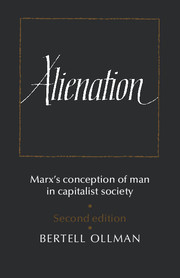Book contents
- Frontmatter
- Contents
- Preface to the second edition
- Note on translations
- Acknowledgements
- General introduction
- PART I PHILOSOPHICAL INTRODUCTION
- PART II MARX'S CONCEPTION OF HUMAN NATURE
- 7 Powers and needs
- 8 Natural man
- 9 Species man
- 10 Relating man to objects: orientation, perception
- 11 Appropriation
- 12 Nature as evidence
- 13 Activity, work, creativity
- 14 Man's social nature
- 15 The character of the species
- 16 Freedom as essence
- 17 Man, classes, people
- PART III THE THEORY OF ALIENATION
- PART IV CONCLUSION
- Appendix I In defense of the philosophy of internal relations
- Appendix II Response to my critics: more on internal relations
- Notes to the text
- Bibliography of works cited
- Index of names and ideas
- Cambridge Studies in the History and Theory of Politics
10 - Relating man to objects: orientation, perception
Published online by Cambridge University Press: 05 June 2012
- Frontmatter
- Contents
- Preface to the second edition
- Note on translations
- Acknowledgements
- General introduction
- PART I PHILOSOPHICAL INTRODUCTION
- PART II MARX'S CONCEPTION OF HUMAN NATURE
- 7 Powers and needs
- 8 Natural man
- 9 Species man
- 10 Relating man to objects: orientation, perception
- 11 Appropriation
- 12 Nature as evidence
- 13 Activity, work, creativity
- 14 Man's social nature
- 15 The character of the species
- 16 Freedom as essence
- 17 Man, classes, people
- PART III THE THEORY OF ALIENATION
- PART IV CONCLUSION
- Appendix I In defense of the philosophy of internal relations
- Appendix II Response to my critics: more on internal relations
- Notes to the text
- Bibliography of works cited
- Index of names and ideas
- Cambridge Studies in the History and Theory of Politics
Summary
The previous chapters dealt with man in the abstract, as an entity possessing powers and needs. It should be clear, however, that this abstract entity has no separate existence for Marx who always sets the individual inside a world of particulars, of other men, institutions, ideas, etc., and sees every one of his powers and needs binding him inextricably to his period. The tie between each individual and the world was proffered in terms of his needing those objects which are necessary for the realization of his powers. Yet, to say that powers are ‘realized’, ‘actualized’, ‘manifested’ or ‘confirmed’ in objects is to say very little in a concrete way about what actually occurs. How exactly do powers, that strange mixture of senses, functions and conditions which Marx attributes to each human being, get realized in objects? And what are the signs of this realization both in man and in nature which serve Marx as evidence, and allow him to claim these objects as part of human nature? Attention will now be directed to these questions.
The relations established between man's powers and the world in Marx's system are the work of three interconnected processes, perception, orientation and appropriation. I call them processes, but I could just as easily refer to them as events or aspects of the same process or event, since they most often occur simultaneously.
- Type
- Chapter
- Information
- AlienationMarx's Conception of Man in a Capitalist Society, pp. 85 - 88Publisher: Cambridge University PressPrint publication year: 1977



